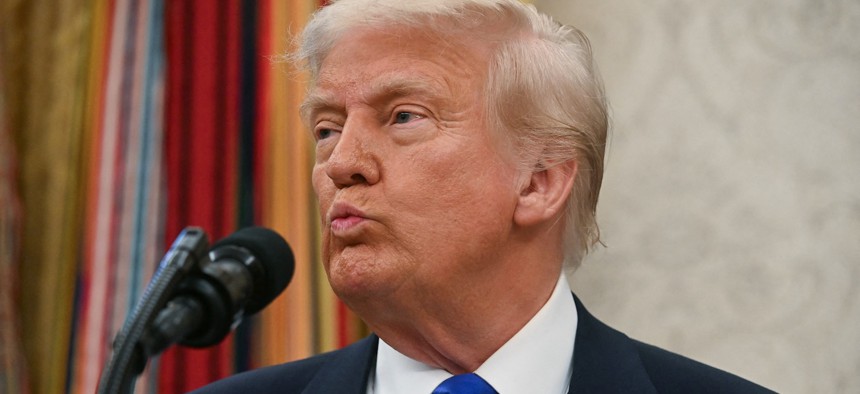
The court's decision could have a cascading impact on scores of ongoing legal battles over the Trump administration’s workforce policies and actions. JIM WATSON/AFP via Getty Images
Appeals court: Has Trump neutered the Civil Service Reform Act?
A three-judge panel on the Fourth Circuit Court of Appeals revived a lawsuit challenging the gag order on federal immigration judges in light of the president’s decision to fire the U.S. special counsel and members of the Merit Systems Protection Board.
A federal appeals court on Tuesday revived the legal challenge against the Justice Department’s rule prohibiting immigration judges from speaking or writing publicly in their personal capacity. The court's decision was procedural yet sweeping in its implications, potentially affecting many other cases challenging President Trump's workforce actions.
In 2020, the National Association of Immigration Judges and Columbia University’s Knight First Amendment Institute sued the Justice Department. They argued the so-called “gag rule”—first issued in 2017, made more restrictive in 2020, and revised again in 2021—violated the judges’ free speech rights.
But in 2023, a judge in the U.S. District Court for Eastern Virginia dismissed the case for lack of jurisdiction, finding that the employee group first must seek redress from the Merit Systems Protection Board before suing in federal court. NAIJ had been classified as a federal employee union until a controversial Federal Labor Relations Authority decision in 2020 to decertify it on the grounds that judges are management officials. The union was formally decertified in 2022.
Now, a three-judge panel on the Fourth Circuit Court of Appeals is sending the case back. In a 32-page decision Tuesday, the panel asked a district court to conduct factfinding around a question: has the Trump administration’s push to fire political leaders at independent agencies like the Merit Systems Protection Board and U.S. Office of the Special Counsel caused the review scheme designed in the 1978 Civil Service Reform act to become “so undermined” as to deny federal workers meaningful review.
“When the Civil Service Reform Act functions as designed, we agree with the district court that the National Association of Immigration Judges would be required to bring its case through its administrative scheme,” wrote Judge Nicole Berner, a Biden appointee, for the court. “It is not clear, however, that the Civil Service Reform Act is currently so functioning.”
The judges instructed the district court to look particularly at Thunder Basin, a landmark Supreme Court decision. That ruling helps courts decide when parties must exhaust administrative review before going to court. The panel questioned whether the Thunder Basin test needs updating in light of recent political interference with independent review bodies.
“The structure of the CSRA relies fundamentally . . . on a strong and independent MSPB and special counsel,” the decision states. “We cannot allow our black robes to insulate us from taking notice of items in the public record, including, relevant here, circumstances that may have undermined the functioning of the CSRA’s adjudicatory scheme.”
The decision could have a cascading impact on scores of ongoing legal battles over the Trump administration’s workforce policies and actions, including the firing of probationary workers, the planned reductions in force across government and the purge of appointees at independent agencies. And though not mentioned in Tuesday’s ruling, union-related cases also could be affected, due to Trump’s firing of erstwhile FLRA Chairwoman Susan Tsui Grundmann.
“This is a pretty big deal,” said Don Kettl, professor emeritus and former dean at the University of Maryland School of Public Policy. “Particularly in how the decision asks whether or not, in taking steps to remove both the special counsel and chair of the MSPB, the Trump administration is pulling on threads to unravel the Civil Service Reform Act, and in whether in doing so risks bringing down the entire civil service system on top of it. It goes beyond what the judges needed to do in deciding this case, and it does it in a deliberate way to pose some truly fundamental questions.”
How are these changes affecting you? Share your experience with us:
Erich Wagner: ewagner@govexec.com; Signal: ewagner.47
NEXT STORY: Trump is planning to slash 107,000 federal jobs next year. See where







